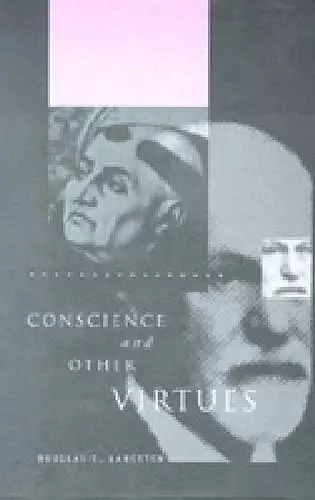Conscience and Other Virtues
From Bonaventure to MacIntyre
Format:Hardback
Publisher:Pennsylvania State University Press
Currently unavailable, and unfortunately no date known when it will be back
This hardback is available in another edition too:
- Paperback£29.95(9780271027890)

Conscience, once a core concept for ethics, has mostly disappeared from modern moral theory. In this book Douglas Langston traces its intellectual history to account for its neglect while arguing for its still vital importance, if correctly understood.
In medieval times, Langston shows in Part I, the notions of "conscientia" and "synderesis" from which our contemporary concept of conscience derives were closely connected to Greek ideas about the virtues and practical reason, although in Christianized form. As modified by Luther, Butler, and Kant, however, conscience later came to be regarded as a faculty like will and intellect, and when faculty psychology fell into disrepute, so did the role of conscience in moral philosophy.
A view of mature conscience that sees it as relational, with cognitive, emotional, and conative dimensions, can survive the criticisms of conscience as faculty. In Part II, through discussions of Freud, Ryle, and other modern thinkers, Langston proceeds to reconstruct conscience as a viable philosophical concept.
Finally, in Part III, this better grounded concept is connected with the modern revival of virtue ethics, and Langston shows how crucial conscience is to a theory of virtue because it is fundamental to the training of any morally good person.
“This important book synthesizes a broad range of historical and contemporary literature dealing with conscience. It traces the development of the notion of conscience in the Western philosophical tradition from antiquity through the early modern period, and it rehabilitates conscience as a useful, even crucial, concept for current ethical theory.”
—Michael G. Baylor, Lehigh University
“Langston’s book provides a good account of the changing conception of conscience and its relation to the virtues. Drawing on his expertise in virtue ethics, Langston traces the rise of a rich medieval conception of conscience as a relational entity.”
—Judith W. Kay Religious Studies Review
“Langston’s work contributes to rethinking conscience in a way that retrieves its dynamic, experimental quality in more contemporary terms involving difference and multiplicity on individual and cultural levels.”
—James J. DiCenso Journal of Religious History
ISBN: 9780271020709
Dimensions: 229mm x 152mm x 17mm
Weight: 481g
200 pages